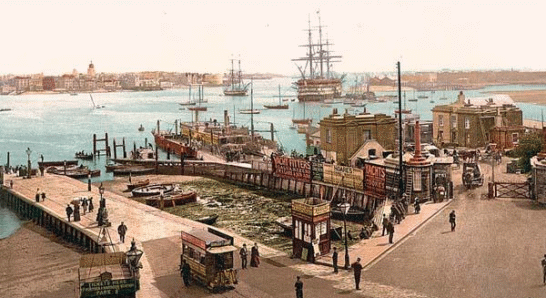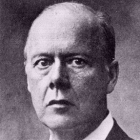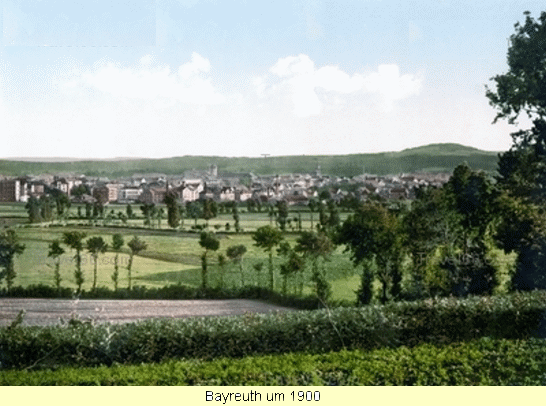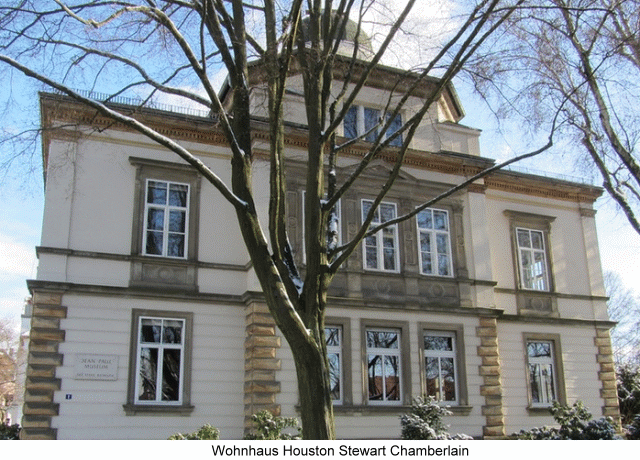|
Houston Stewart Chamberlain
* 9. September 1855 in
Southsea/Portsmouth 
† 9. Januar 1927 in Bayreuth

Schriftsteller,
Ehrenbürger der Stadt Bayreuth.
Chamberlain was born in Southsea, England. His mother, Eliza Jane Hall, died before he was a year old and he was raised by his grandmother in France. Chamberlain's father, Captain William Charles Chamberlain, (later Rear-Admiral), had planned a military career for his son, and at 11 years old he was sent to a boarding school for future army and navy officers. But the young Chamberlain was more interested in studying music, literature and astronomy, and the prospect of serving as an officer in India or elsewhere in the British Empire held no attractions for
him.
By the age of 14 Chamberlain was in poor health. Doctors wrongly suspected that he had a disease of the respiratory organs, and he left England to visit one health resort after another — Bad Ems, Montreux and Cannes. He was accompanied by his aunt and a Prussian private teacher, Otto
Kuntze  , who taught his studious pupil German and interested him in German history, literature and philosophy. In 1874 Chamberlain's father arrived in Switzerland to persuade him to finish his studies in England, but Chamberlain refused. By now, his bad experiences in England had coupled with his French upbringing to alienate him from his fatherland. It was in Cannes that he met his first wife, Anna Horst, whom he married in 1878. , who taught his studious pupil German and interested him in German history, literature and philosophy. In 1874 Chamberlain's father arrived in Switzerland to persuade him to finish his studies in England, but Chamberlain refused. By now, his bad experiences in England had coupled with his French upbringing to alienate him from his fatherland. It was in Cannes that he met his first wife, Anna Horst, whom he married in 1878.
Chamberlain moved to Florence to study botany at the university. As things turned out, though, Florence offered so many artistic impressions that Chamberlain spent seven months there in a kind of cultural
shock. He was caught in a comparable situation later on when he encountered the works of Shakespeare and the music of Richard Wagner. In 1879 Chamberlain enrolled in the faculty of natural sciences at the University of Geneva, where he obtained his bachelor's degree. He then moved to Dresden and began work on a dissertation about the rise of plant saps. But his illness flared up again, and this time the doctors diagnosed neurasthenia — a popular disease at the time. Chamberlain had to rest, and while recuperating he began studying history, philosophy, literature and music, as well as writing his first essay in German.
Chamberlain moved to Vienna in 1889 to continue his research into plant
physiology. Soon, however, he was determined to become a
writer. Chamberlain's most important work is 'Die Grundlagen des neunzehnten Jahrhunderts'
 (The Foundations of the Nineteenth Century), 1899. The book's central idea is that Western civilization's moral, cultural, scientific and technological superiority comes largely from the positive influence of the Germanic race (Slavs and Celts included) on the progress of history down the
ages. We wrote:
(The Foundations of the Nineteenth Century), 1899. The book's central idea is that Western civilization's moral, cultural, scientific and technological superiority comes largely from the positive influence of the Germanic race (Slavs and Celts included) on the progress of history down the
ages. We wrote:
„Certain anthropologists would fain teach us that all races are equally gifted; we point to history and answer: that is a lie! The races of mankind are markedly different in the nature and also in the extent of their gifts, and the Germanic races belong to the most highly gifted group, the group usually termed Aryan. Is this human family united and uniform by bonds of blood? Do these stems really all spring from the same root? I do not know and I do not much
care... Opponents of the Germanic race would be the Roman Catholic Church,
Jewry, the Jesuit Order and other obscure forces, who fought and still fight a racial war,
the war still waged among us between those elements that advance and those that retard
culture“.
Although the book was received with reservation
by the Church and in Jewish circles, it became a best-seller in Germany, was translated into English and French, and had an important influence on its contemporaries. In his review of The Foundations George Bernard Shaw wrote:
„It is a masterpiece of really scientific history. It does not make
confusion, it clears it away. He is a great generalizer of thought, as distinguished from the crowd of our mere
specialists. It is certain to stir up thought. Whoever has not read it will be rather out of it in political and sociological discussions for some time to come.“
And President Theodore Roosevelt, although not an admirer of Chamberlain's
work, wrote: „... a man who can write such a really beautiful and solemn appreciation of true
Christianity, of true acceptance of Christ's teachings and personality, as Mr. Chamberlain has
done, ... represents an influence to be reckoned with and seriously to be taken into
account.“ Albert Schweitzer  became also fascinated by Chamberlain's master piece.
became also fascinated by Chamberlain's master piece.
According to Chamberlain, Germanic forces, embodied by Francis of Assisi, Martin Luther and others, turned Christianity into the religion that Jesus had
envisioned. The Old Testament should be removed from the Bible (with the exception of a few psalms) to sever any remaining links between Christianity and Judaism.
Chamberlain also wrote a book, 'Arische Weltanschauung' ( Aryan World View),
in which he expressed the opinion that knowledge of the Indo-Aryan philosophy would serve as a counter-balance against a Semitic
world-view.
Chamberlain became fascinated by Richard Wagner  . He attended the première and the following five performances of Wagner's Parsifal in Bayreuth during July 1882. Wagner died the following year before the two men had ever met, but his genius had a lasting influence on Chamberlain. In 1896 he published his second Wagner-book (Richard Wagner), a popular and important work, still regarded as a classic. He became honorary member of the Viennese Akademische Wagnerverein. During his life he wrote an estimated 50 essays about Wagner and his music. One of these,
'Künstlerische Dankbarkeit', which compared Wagner and Franz Liszt, was read by Liszt's daughter, Cosima Wagner, and in 1888 she invited Chamberlain to a meeting. Thus began a lasting friendship, and the two carried on an extensive correspondence until 1908. In that year Chamberlain married his second wife,
Eva, the daughter of Richard and Cosima Wagner. . He attended the première and the following five performances of Wagner's Parsifal in Bayreuth during July 1882. Wagner died the following year before the two men had ever met, but his genius had a lasting influence on Chamberlain. In 1896 he published his second Wagner-book (Richard Wagner), a popular and important work, still regarded as a classic. He became honorary member of the Viennese Akademische Wagnerverein. During his life he wrote an estimated 50 essays about Wagner and his music. One of these,
'Künstlerische Dankbarkeit', which compared Wagner and Franz Liszt, was read by Liszt's daughter, Cosima Wagner, and in 1888 she invited Chamberlain to a meeting. Thus began a lasting friendship, and the two carried on an extensive correspondence until 1908. In that year Chamberlain married his second wife,
Eva, the daughter of Richard and Cosima Wagner.
Chamberlain became emperor Wilhelm II's  friend. In one of his letters Chamberlain advised the Emperor:
friend. In one of his letters Chamberlain advised the Emperor:
„Deutschland [...] kann dahin gelangen, die gesamte Erdkugel (teils unmittelbar politisch, teils mittelbar, durch Sprache, Kultur, Methoden) zu beherrschen, wenn es nur gelingt, beizeiten den 'neuen Kurs' einzuschlagen, und das heißt, die Nation zum endgültigen Bruch mit den angloamerikanischen Regierungsidealen zu bringen. Die Freiheit, die Deutschland braucht, ist die [...] unbeschränkte Freiheit des Denkens, der Religion, der Wissenschaft — nicht die Freiheit, sich selber schlecht zu regieren.“
(„Germany [...] can achieve complete control of the world (partly by direct political
means, partly by language, culture, methods), only if it succeeds in taking a new direction in time, which means the final rupture with Anglo-American ideals of
government. The freedom that Germany needs is the [...] unlimited freedom of
thought, of religion, of science — not the freedom to rule itself badly.“)
(19).
After England allied with the Entente forces in World War I (1914–1918), Chamberlain accused his fatherland of treason to the Germanic
race. In 1915 Chamberlain received the Iron Cross for services to the German
empire. He became a German citizen in 1916. Chamberlain met Adolf
Hitler  in Bayreuth on September 30th, 1923. In May 1926, Hitler visited the old writer for the last time.
Chamberlain died of his nervous disease a few months later in Bayreuth. Upon his gravestone were engraved the words of Luke 17:21: „Das Reich Gottes ist inwendig in euch“.
(The Kingdom of God is within you).
In
1922, Chamberlain was nominated honorary freeman of the city of Bayreuth.
He legated to Bayreuth an important heritage and his house.
in Bayreuth on September 30th, 1923. In May 1926, Hitler visited the old writer for the last time.
Chamberlain died of his nervous disease a few months later in Bayreuth. Upon his gravestone were engraved the words of Luke 17:21: „Das Reich Gottes ist inwendig in euch“.
(The Kingdom of God is within you).
In
1922, Chamberlain was nominated honorary freeman of the city of Bayreuth.
He legated to Bayreuth an important heritage and his house.
In 1988,
burgomaster Dieter Mronz (aside) deprived Chamberlain of his honorary dignity,
without being ashamed of retaining his generous legacy (see below).
ABCD
Weitere
Infos: 



|
|
ABC
Zitate
Von meinen Interessen etwas zu opfern, ehrt mich, von meiner Überzeugung etwas zu opfern, entehrt mich.
Geschichte fälschen ist in einem gewissen Sinne noch schlimmer als Wechsel fälschen, es kann von unermeßlicher Tragweite sein.
Wer
– um nur einige zu nennen – mit Dürer und Holbein, wer mit Bach und
Beethoven, mit Goethe, Schiller und Richard Wagner in Ehrfurcht und Liebe
vertraut ist, wird deutsche Weltanschauung stets auf den ersten Blick von
jeder anderen zu unterscheiden wissen.
Ich kann dir nicht sagen, wie mein Glaube an Deutschland zunimmt. Je mehr
ich andere Nationen kennenlerne…, desto mehr liebe ich Deutschland und
die Deutschen. Mein Glaube, daß die ganze Zukunft Europas … Deutschland
in Händen liegt, ist zur Sicherheit geworden. … Ach du geliebte
deutsche Nation! Wirst du denn nie die Größe deiner Aufgabe entdecken
und einsehen, daß deine Wege nicht die anderer Völker sein dürfen?
Deutschland allein unter allen Nationen wahrt heute noch ein lebendiges,
entwicklungsfähiges Heiliges.
Ich habe die unerschütterliche Überzeugung [...] daß Gott den Deutschen für edle Zwecke der ganzen Menschheit zum Heile hat werden und wachsen
lassen.
...aber
diese guten Deutschen haben in dieser Hinsicht, in manch anderer auch,
fürchte ich, einen sehr verdorbenen oder besser überhaupt keinen
Geschmack. Sie lieben alles Ungesunde, Schwere, Unverdauliche, — nähren
sich von stopfenden Sachen und essen nichts Nahrhaftes. Dabei und bei
ihrem gänzlich unathletischen Leben ist es ein Wunder, wie diese Rasse so
kraftvoll bleibt; sicher ist das eine Gottesgabe, — sie selbst tun
nichts dazu.
Ich gestehe, daß eine deutsche Memme oder ein germanischer Esel mir viel
weniger sympathisch ist als ein ernster und leistungsfähiger Künstler
jüdischer Abkunft...
...eine
der bewundernswertesten Eigenschaften der Juden [...] war ihre Sorge, die
Rasse rein zu erhalten...
...dass der Jude, dank dem Hesekiel, der Lehrmeister aller Intoleranz,
alles Glaubensfanatismus, alles Mordens um der Religion willen ist, dass
er an die Duldsamkeit immer nur dann appellierte, wenn er sich bedrückt
fühlte, dass er sie selber jedoch niemals übte noch üben durfte, denn
sein Gesetz verbot es ihm und verbietet es ihm auch heute — und
morgen.
Nicht aber der Jude allein, sondern alles, was vom jüdischen Geist
ausgeht, ist ein Stoff, welcher das Beste in uns zernagt und
zersetzt.
Wer die Mohammedaner kennt, der weiss, dass ihr Religionsglaube, wenn auch
gewiss der sterilste, so doch der stärkste von allen ist; bei uns ist nur
eine Minderzahl fähig, sich die Krone des Märtyrertums zu verdienen,
dort ist es fast ein jeder.
...wir steuern auf das Chaos zu. Es ist hohe Zeit, daß wir zur Besinnung erwachen; nicht um Anderen ihre geistige Freiheit zu schmälern, sondern damit wir Herren im eigenen Hause
werden...
ABCD
|





















